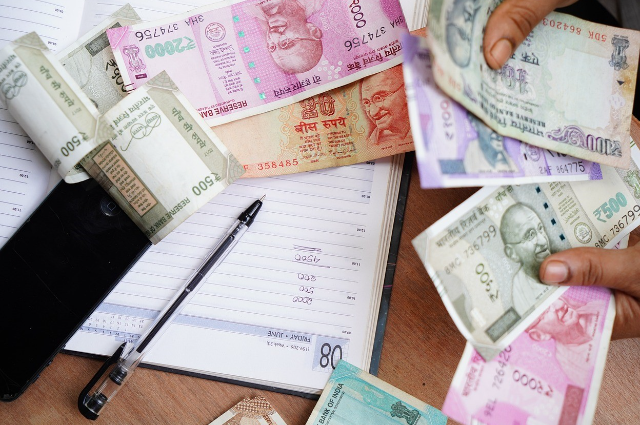
Image by Shameer Pk from Pixabay
Introduction:
In the labyrinthine world of finance and commerce, where the complexities of modern economies intertwine, a clandestine breed of crimes thrives - white-collar crimes. In the heart of India's bustling economic landscape, these covert transgressions have left an indelible mark on both its economy and society. Beyond the headlines and beneath the surface, the repercussions of white-collar crimes run deep, affecting not only balance sheets but the very fabric of our communities. White-collar crimes, characterized by their non-violent, financially motivated nature, encompass a wide range of illicit activities. From corporate fraud and embezzlement to insider trading and money laundering, these crimes erode trust in institutions, deplete resources, and, at times, can lead to financial crises that ripple through the entire nation.
The impact of white-collar crimes extends far beyond monetary losses. Families can lose their life savings, employees their jobs, and investors their faith in the financial system. Moreover, these crimes corrode the very foundation of trust that underpins economic transactions, hindering India's potential for sustainable growth and development. Understanding white-collar crimes is not just the prerogative of law enforcement agencies and regulatory bodies; it's a vital skill for businesses and individuals alike. For companies, awareness and proactive measures can protect assets and reputations. For individuals, it's about safeguarding personal finances and making informed investment choices. This article embarks on a journey to dissect the anatomy of white-collar crimes, shedding light on their covert operations and the systemic vulnerabilities they exploit. It also equips readers with the knowledge needed to navigate this complex landscape and emphasizes the pivotal role each one of us plays in mitigating the far-reaching effects of these crimes on India's economy and society.
White-collar crime and its distinguishing features:
White-collar crime, a term coined by sociologist Edwin Sutherland in the late 1930s, stands as a stark contrast to traditional, often violent, criminal activities. What set it apart are its distinguishing features, primarily its non-violent, financially motivated nature. Unlike the typical street crimes that capture headlines, white-collar crimes unfold quietly within the corridors of corporations, government offices, and financial institutions. These offenses encompass a vast spectrum, ranging from embezzlement and insider trading to bribery and tax evasion. Yet, they all share a common thread – they are driven by a desire for financial gain, typically at the expense of others. This unique aspect of white-collar crime challenges conventional notions of criminal behavior, making it a complex and intriguing field of study. Understanding these distinguishing features is essential to grasp the breadth and depth of this often underestimated category of crime.
Economic and societal consequences of these crimes:
The economic and societal consequences of white-collar crimes are profound and far-reaching. Economically, these crimes can siphon vast sums of money from businesses and institutions. Corporate fraud, for instance, can lead to substantial financial losses, jeopardizing the stability of companies and causing layoffs that ripple through communities. Insider trading can undermine the integrity of financial markets, eroding investor trust and, in extreme cases, precipitating market crashes. Money laundering can facilitate other criminal enterprises, further destabilizing economies. Moreover, the cumulative impact of these crimes can weaken a nation's financial infrastructure, hindering its ability to foster sustainable growth and development.
On a societal level, white-collar crimes corrode the foundations of trust upon which societies are built. When individuals in positions of authority engage in fraudulent activities, it erodes the public's faith in institutions, from corporations to government bodies. This loss of trust can lead to cynicism and disillusionment among citizens, affecting their willingness to participate in economic activities and comply with the law. Families can lose their life savings, employees their jobs, and investors their confidence in the financial system, leading to a breakdown in social cohesion. Therefore, comprehending the economic and societal ramifications of white-collar crimes becomes essential in safeguarding not only the financial well-being of individuals and businesses but also the overall stability of society itself.
Notable financial fraud cases and corporate scandals in India:
- Satyam Computer Services Scandal (2009): This massive corporate scandal involved one of India's leading IT companies, Satyam Computer Services. Its founder and chairman, Ramalinga Raju, confessed to inflating the company's revenue and profit figures for years, resulting in a fictitious cash balance of over $1 billion. The scandal shook India's corporate world and led to a government takeover of the company.
- Punjab National Bank (PNB) Fraud (2018): This high-profile banking scandal involved diamond merchant Nirav Modi and his uncle Mehul Choksi, who defrauded PNB of over $2 billion by securing fraudulent letters of undertaking. The case exposed vulnerabilities in India's banking system and led to calls for stricter banking regulations.
- Kingfisher Airlines Debacle (2012): Vijay Mallya's Kingfisher Airlines, once a prominent player in India's aviation industry, faced allegations of financial mismanagement and defaulting on loans worth over $1 billion. The airline's collapse left a trail of unpaid debts and job losses.

Image by Sam Williams from Pixabay
- Saradha Group Chit Fund Scam (2013): Operating primarily in West Bengal, the Saradha Group ran a massive Ponzi scheme that defrauded thousands of investors. The scam revealed the regulatory gaps in the chit fund industry and led to investigations and arrests.
- IL&FS Financial Crisis (2018): Infrastructure Leasing & Financial Services (IL&FS) faced a severe liquidity crisis, exposing the fragility of India's infrastructure financing sector. This crisis had cascading effects on the financial markets and raised questions about corporate governance.
Corruption and Bribery:
Corruption and bribery, as pervasive global issues, have profound implications for governments, businesses, and societies. In India, corruption has been a long-standing challenge, affecting every facet of public life. This deeply rooted issue has corroded the foundations of trust within government institutions, crippled businesses, and perpetuated social inequalities. In India, corruption's impact on the government is conspicuous. It undermines the effectiveness of public policies, siphoning off resources meant for welfare and development. The intricate web of bribery can stifle economic growth, deter foreign investments, and tarnish the nation's image on the global stage. High-profile corruption cases, such as the 2G spectrum scam and the coal allocation scandal, have exposed the magnitude of this issue. These cases involve misappropriation of public resources worth billions, casting a shadow over the integrity of political and bureaucratic systems. Within the business realm, corruption poses significant risks. Companies often find themselves caught in the crossfire of corrupt practices, ranging from demands for bribes to expedite permits to unfair competition due to corrupt business practices. The corporate sector must navigate these murky waters, which can impact their reputation and operational efficiency.
In society, corruption exacerbates social inequalities. Bribes become an additional tax on the poor, making access to basic services like healthcare and education more difficult. The cycle of corruption perpetuates poverty and hampers social mobility, creating a sense of injustice among citizens. Despite the grim outlook, India has taken steps to combat corruption. The establishment of anti-corruption agencies like the Central Bureau of Investigation (CBI) and the enactment of legislation such as the Prevention of Corruption Act reflect the government's commitment to tackling this issue. Additionally, technology-driven initiatives like the e-auction of resources aim to enhance transparency.
However, challenges persist in the enforcement of anti-corruption measures. The slow pace of legal proceedings, lack of political will, and the deeply entrenched nature of corruption pose significant obstacles. Moreover, civil society organizations, whistleblowers, and the media play a vital role in exposing corruption, often facing threats and reprisals in their pursuit of justice. Corruption and bribery remain formidable obstacles to India's progress, impacting government institutions, businesses, and society at large. High-profile cases underscore the urgency of addressing this issue. Effective anti-corruption measures require a multifaceted approach, including legal reforms, transparency-enhancing technologies, and a collective societal commitment to ethical governance. Only through concerted efforts can India hope to mitigate the damaging effects of corruption and foster a fairer and more prosperous society.
Insider trading in Indian markets:
Insider trading in Indian markets, like in many other global financial ecosystems, has been a persistent concern. This unlawful practice involves trading securities based on non-public, material information that could significantly impact a company's stock price. Such insider information might include financial results, mergers and acquisitions, or impending regulatory decisions. The impact of insider trading on the Indian markets is multifaceted. Firstly, it erodes investor trust in the fairness and transparency of the stock market. When insiders gain an unfair advantage by exploiting privileged information, it creates an uneven playing field, deterring individual and institutional investors. Additionally, it undermines the integrity of publicly listed companies and can lead to financial losses for unsuspecting shareholders. High-profile cases, such as the Satyam Computer Services scandal, where the founder confessed to falsifying financial information, have highlighted the devastating effects of insider trading on India's corporate landscape.
To combat insider trading, India has enacted stringent regulations, primarily under the Securities and Exchange Board of India (SEBI). These regulations aim to detect and deter insider trading activities through rules governing disclosure, trading windows, and the prohibition of sharing material non-public information. SEBI has also established surveillance mechanisms and a market-wide monitoring system to detect suspicious trading patterns. Despite these efforts, the challenges of enforcement and the need for continuous vigilance remain, as insider trading can adapt to evolving market dynamics and technologies. insider trading poses a significant challenge to the integrity of Indian financial markets, impacting investor confidence, corporate governance, and market fairness. The regulatory framework in place strives to curb this practice, but its effectiveness depends on the ability to detect and prosecute insider trading cases promptly. As India's markets continue to evolve, addressing insider trading remains crucial to maintaining trust and transparency in the financial sector.
Money Laundering and Tax Evasion:
Money laundering and tax evasion by big companies in India have been subjects of considerable concern and debate. Money laundering involves disguising the origins of illegally obtained funds by making them appear legitimate, often through a complex web of financial transactions. Tax evasion, on the other hand, entails deliberately underreporting income or inflating expenses to reduce tax liabilities. The impact of these illicit activities is far-reaching. When big companies engage in money laundering and tax evasion, it not only erodes the government's tax revenue but also creates an uneven playing field for smaller businesses that struggle to compete. Moreover, it undermines the overall fiscal health of the nation, leading to reduced public resources for essential services such as healthcare, education, and infrastructure development.
Several high-profile cases have shed light on these issues, including the Vodafone tax dispute and the Panama Papers leak, which implicated several Indian entities. Such cases not only draw public attention but also underscore the urgency of addressing money laundering and tax evasion. Efforts to combat these issues have included legislative measures, international cooperation, and increased scrutiny by regulatory authorities like the Income Tax Department and the Enforcement Directorate. Initiatives like the Common Reporting Standard (CRS) and the Financial Action Task Force (FATF) framework aim to enhance transparency and information sharing on a global scale.
Nonetheless, significant challenges persist. The complexity of financial transactions, offshore tax havens, and the ability of big companies to employ sophisticated tax planning strategies make detection and prosecution difficult. Strengthening regulatory frameworks, improving data sharing between countries, and fostering a culture of corporate responsibility are essential steps in addressing these issues effectively. money laundering and tax evasion by big companies in India have ramifications that extend beyond the corporate world. They impact the nation's fiscal health, hinder fair competition, and demand vigilant efforts from both regulatory bodies and the corporate sector to ensure compliance with tax laws and financial regulations.

Ponzi Schemes and Investment Frauds:
Ponzi schemes and investment frauds have left a trail of victims among Indian investors, highlighting the need for heightened vigilance in the financial sector. Ponzi schemes, named after Charles Ponzi, involve enticing investors with promises of high returns, often paying earlier investors with funds from newer ones rather than legitimate profits. These fraudulent schemes often prey on individuals' desire for quick wealth and financial security. Several notorious Ponzi schemes have victimized Indian investors, such as the Saradha Group and the Rose Valley scam. In both cases, investors were lured by the promise of substantial returns, only to lose their hard-earned savings when the schemes collapsed. The magnitude of these frauds is staggering, involving thousands of crores of rupees.
Investment frauds extend beyond Ponzi schemes, encompassing various fraudulent investment schemes and scams. These scams exploit regulatory gaps and unsuspecting investors, leading to significant financial losses. The Speak Asia scam, for example, deceived investors through an online survey-based model, ultimately defrauding thousands. The impact of these schemes on Indian investors is devastating, not only resulting in severe financial losses but also eroding trust in the financial system. Victims often face challenges in recovering their investments, while regulatory bodies like SEBI work to investigate and prosecute those responsible.
To address these issues, authorities have been striving to enhance regulatory oversight, educate investors about the risks of fraudulent investments, and streamline the process for reporting and addressing such scams. However, the ever-evolving tactics of fraudsters necessitate continuous efforts to safeguard investors and maintain the integrity of India's financial markets. Ponzi schemes and investment frauds have had a detrimental impact on Indian investors, highlighting the importance of investor education, regulatory diligence, and the swift prosecution of fraudulent actors. Vigilance is key to preventing future victimization and preserving trust in the financial sector.
Technology-Driven White-Collar Crimes:
Technology-driven white-collar crimes in India have witnessed a concerning surge with the rapid digitization of the economy. These sophisticated offenses harness the power of technology to commit financial fraud, data breaches, and cyberattacks, posing significant challenges to businesses and individuals alike. One notable example is the rise of online financial frauds, where criminals employ phishing, identity theft, or malware to trick individuals into revealing sensitive financial information or conducting unauthorized transactions. These crimes not only cause substantial financial losses but also erode trust in online financial systems. Additionally, data breaches have become a prevalent threat. Cybercriminals target businesses and government entities to steal sensitive data, which can be exploited for financial gain or sold on the dark web. High-profile data breaches, such as those affecting financial institutions and e-commerce platforms, have exposed the vulnerabilities of India's digital landscape. Furthermore, the growth of crypto currency has introduced new dimensions to white-collar crime. Crypto currency-related scams, Ponzi schemes, and fraudulent initial coin offerings (ICOs) have become common. These schemes leverage the anonymity of crypto currencies to defraud unsuspecting investors.
Combating these technology-driven white-collar crimes is an ongoing challenge. Law enforcement agencies are working to enhance their digital forensic capabilities and collaborate with international counterparts. Additionally, regulatory bodies like the Reserve Bank of India (RBI) and the Securities and Exchange Board of India (SEBI) have introduced cybersecurity guidelines and measures to protect the financial ecosystem. However, the constantly evolving nature of technology-driven crimes demands continuous vigilance, education, and a proactive approach to cyber security for businesses and individuals alike. technology-driven white-collar crimes in India reflect the changing landscape of financial offenses in the digital age. While technology offers numerous benefits, it also presents new opportunities for criminal activities. Staying ahead of these crimes necessitates a combination of robust cybersecurity measures, effective law enforcement, and public awareness to ensure the security of India's digital economy.
Challenges in Investigating and Prosecuting White-Collar Crimes:
Investigating and prosecuting white-collar crimes presents a unique set of challenges that often differ from those associated with more conventional criminal activities. These challenges stem from the complexity, sophistication, and often cross-border nature of white-collar offenses. Here are some of the key challenges in investigating and prosecuting white-collar crimes:
- Digital Sophistication: Many white-collar crimes are technology-driven, involving hacking, data breaches, or financial frauds conducted online. The digital sophistication of these offenses can make it difficult for investigators to trace the origins of the crime and gather concrete evidence.
- Paper Trails and Documentation: White-collar crimes often leave extensive paper trails, but they can also involve intricate financial transactions and complex corporate structures. Investigating and deciphering these documents requires specialized expertise and resources.
- Corporate Obfuscation: Large corporations can shield individuals responsible for white-collar crimes through layers of bureaucracy and legal protections. Unraveling these corporate structures to pinpoint culpable parties can be a formidable task.
- Cross-Border Jurisdiction: Many white-collar crimes transcend national borders, making jurisdictional issues a significant challenge. Coordinating international investigations and extradition processes can be time-consuming and complex.
- Limited Resources: Law enforcement agencies may face resource constraints when investigating white-collar crimes, as these cases can be lengthy and resource-intensive. This can lead to a lack of specialized personnel and technology to handle complex financial investigations.
- Lack of Whistleblower Protection: Encouraging whistleblowers to come forward with information about white-collar crimes can be challenging due to concerns about retaliation and the absence of robust whistleblower protection laws.
- Legal Complexities: White-collar crimes often involve intricate legal issues, such as interpreting complex financial regulations, securities laws, and accounting standards. Prosecutors must navigate these complexities to build a strong case.
- Witness Cooperation: In cases involving high-ranking executives or individuals with significant influence, obtaining cooperation from witnesses can be challenging due to fears of professional and personal repercussions.

Image by Free stock photos from www.rupixen.com from Pixabay
- Public Perception: There can be a perception that white-collar crimes are not as serious as other criminal offenses, which may result in less public pressure to investigate and prosecute these cases rigorously.
- Statute of Limitations: Some white-collar crimes may have statutes of limitations that can expire before an investigation is completed, making prosecution impossible for older cases.
Regulatory framework governing white-collar crimes in India:
The regulatory framework governing white-collar crimes in India is a combination of statutory laws, regulatory authorities, and judicial mechanisms. Here are the key components of this framework:
- Indian Penal Code (IPC): The IPC contains provisions that deal with various white-collar crimes, such as fraud, cheating, forgery, counterfeiting, and criminal breach of trust. Sections 403 to 439 cover offenses related to property, while Sections 465 to 477A pertain to offenses involving documents and currency notes.
- Prevention of Corruption Act, 1988: This act addresses corruption-related offenses by public servants. It defines offenses like bribery, criminal misconduct, and abuse of official position and outlines the penalties for such offenses.
- The Companies Act, 2013: The Companies Act includes provisions related to corporate governance, financial reporting, and the prevention of corporate fraud. It establishes regulatory bodies like the Ministry of Corporate Affairs and the National Company Law Tribunal (NCLT) to oversee corporate compliance and investigate irregularities.
- SEBI (Securities and Exchange Board of India) Regulations: SEBI, as the primary regulator of securities markets in India, enforces regulations to prevent insider trading, market manipulation, and fraudulent practices in the capital markets. SEBI has powers to investigate and penalize violations of these regulations.
- Income Tax Act: The Income Tax Act contains provisions related to tax evasion and fraud. It includes penalties for tax evasion, concealment of income, and the use of fraudulent documents in tax matters.
- Banking Regulations: The Reserve Bank of India (RBI) and other financial regulators have guidelines and regulations in place to oversee financial institutions, prevent money laundering, and combat financial fraud.
- Enforcement Directorate (ED): The ED is a specialized law enforcement agency responsible for investigating and prosecuting offenses related to money laundering under the Prevention of Money Laundering Act, 2002.
- Central Bureau of Investigation (CBI): The CBI is the premier investigative agency in India, responsible for investigating cases related to corruption, economic offenses, and high-profile white-collar crimes.
- Specialized Courts and Tribunals: India has established specialized courts and tribunals to handle white-collar crime cases. These include the Serious Fraud Investigation Office (SFIO) and the National Company Law Tribunal (NCLT), which deal with corporate frauds and insolvency-related matters.
- Whistleblower Protection Laws: The Whistleblowers Protection Act, 2014, aims to protect whistleblowers who expose corruption and wrongdoing in both government and private sector organizations.
- International Cooperation: India has entered into various international agreements and conventions to facilitate cooperation in the investigation and prosecution of transnational white-collar crimes, such as money laundering and terrorism financing.
Recent legal reforms aimed at enhancing transparency and accountability:
Recent legal reforms in India have been enacted with the primary goal of enhancing transparency and accountability across various sectors. These reforms reflect the government's commitment to modernize existing laws and address emerging challenges in the areas of governance, finance, and business.
- Insolvency and Bankruptcy Code (Amendment) Act, 2020: This amendment introduced several key changes to the Insolvency and Bankruptcy Code (IBC) to streamline the resolution process for distressed companies. It aimed to enhance transparency by setting clear timelines for resolution and improving the position of creditors in the insolvency proceedings. These reforms have strengthened India's insolvency framework, making it more efficient and accountable.
- Companies (Amendment) Act, 2020: This amendment to the Companies Act, 2013, introduced significant reforms to enhance corporate governance and transparency. It includes measures to decriminalize certain offenses, strengthen the position of independent directors, and tighten regulations related to auditors and financial reporting. These changes promote accountability and integrity in the corporate sector.
- Whistleblowers Protection Act, 2019: This act seeks to protect whistleblowers who expose corruption and wrongdoing in both government and private sector organizations. It aims to enhance transparency by providing legal safeguards for individuals who report misconduct.
- Foreign Contribution (Regulation) Amendment Act, 2020: This amendment tightened regulations governing foreign funding to non-governmental organizations (NGOs) and associations. It seeks to ensure transparency in the use of foreign contributions and prevent misuse.
- Consumer Protection Act, 2019: This act replaced the previous Consumer Protection Act of 1986 and introduced several provisions to protect consumers' rights and enhance accountability in the consumer goods and services sector. It established the Central Consumer Protection Authority (CCPA) to investigate consumer complaints and take appropriate action against unfair trade practices.
- Goods and Services Tax (GST) Reforms: Ongoing reforms in the GST regime aim to simplify tax procedures, reduce tax evasion, and enhance transparency in indirect taxation. Initiatives like the e-invoicing system and the introduction of the e-way bill system are part of these efforts.
- Data Protection Legislation: India is currently in the process of formulating comprehensive data protection legislation, the Personal Data Protection Bill, 2019. If enacted, this bill would introduce regulations to govern the collection, processing, and protection of personal data, enhancing transparency and accountability in the digital ecosystem.
Recommendations for preventing and addressing white-collar crimes in India:
Preventing and addressing white-collar crimes in India requires a multi-faceted approach that combines legal reforms, regulatory enforcement, and corporate responsibility. Here are some recommendations:
- Strengthen Regulatory Frameworks: Continuously update and strengthen existing laws and regulations related to white-collar crimes, including fraud, corruption, and financial misconduct. Ensure that these regulations cover emerging areas such as cybercrimes and cryptocurrency.
- Enhance Enforcement: Improve the capacity and effectiveness of investigative agencies like the Central Bureau of Investigation (CBI) and the Enforcement Directorate (ED) to handle complex white-collar crime cases. This includes providing adequate training, resources, and technology to investigators.

Image by Shameer Pk from Pixabay
- Whistleblower Protection: Strengthen whistleblower protection laws and mechanisms to encourage individuals to report wrongdoing without fear of retaliation. Establish confidential reporting channels and ensure that whistleblowers are shielded from harm.
- Transparency in Corporate Governance: Promote transparency and accountability in corporate governance through reforms like mandatory disclosure of beneficial ownership and stricter reporting requirements for companies. Encourage independent audits and board oversight.
- Anti-Corruption Measures: Implement and enforce robust anti-corruption measures, including strict penalties for bribery and corruption in both the public and private sectors. Promote a culture of ethics and integrity within organizations.
- Financial Education: Promote financial literacy and education to help individuals and businesses better understand financial risks and make informed decisions. This can reduce susceptibility to financial fraud schemes.
- Digital Security: Strengthen cybersecurity measures to protect financial and personal data from cybercrimes. Encourage organizations to adopt best practices for data protection and regularly update security protocols.
- International Cooperation: Collaborate with international agencies and organizations to combat transnational white-collar crimes, such as money laundering and tax evasion. Exchange information and coordinate investigations to pursue offenders globally.
- Public Awareness: Conduct public awareness campaigns to educate citizens about the risks of white-collar crimes and how to protect themselves. Encourage reporting of suspicious activities.
- Corporate Social Responsibility (CSR): Encourage businesses to incorporate ethical practices and social responsibility into their operations. CSR initiatives can help build trust and prevent unethical behavior.
- Fast-Track Courts: Establish dedicated fast-track courts to expedite the trial of white-collar crime cases, reducing the backlog of pending cases and ensuring timely justice.
- Regular Audits: Mandate regular audits of financial institutions and corporations to detect irregularities and fraud. Independent audits can serve as a deterrent and early warning system.
- Government Integrity: Promote transparency and integrity within government institutions by reducing bureaucratic red tape, improving public service delivery, and minimizing opportunities for corruption.
Conclusion:
The landscape of white-collar crimes in India is evolving, presenting new challenges and opportunities for prevention and prosecution. While legislative reforms and regulatory bodies work diligently to strengthen the nation's defenses, the onus of safeguarding against these crimes also falls on individuals, businesses, and the wider community. As responsible citizens, it is crucial to stay vigilant and informed about the various forms of white-collar crimes that can affect us all. Understanding the signs, reporting suspicious activities, and supporting whistleblower protection mechanisms can play a pivotal role in curbing financial misconduct and corruption.
Furthermore, we must underscore the vital role of ethical business practices and corporate governance. Companies that prioritize transparency, accountability, and integrity not only protect themselves from legal repercussions but also contribute to a healthier, more robust economic ecosystem. Consumers and investors alike should reward and promote businesses that adhere to these principles. Ultimately, the fight against white-collar crimes in India requires a collective effort - one that combines stringent laws, diligent enforcement, and a commitment to ethical conduct. By staying informed, remaining vigilant, and championing ethical business practices, we can play a crucial part in preserving the integrity of our financial systems and ensuring a fair and just society for all.
. . .
References:
- White Collar Crimes in India by M.R. Agarwal
- White-Collar Crimes in India: Challenges and Reforms by Dr. S. K. Singh
- Economic Crimes and Offenses" edited by B. C. Nirmal
